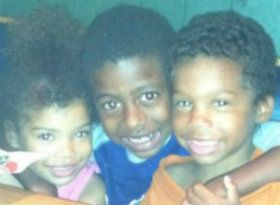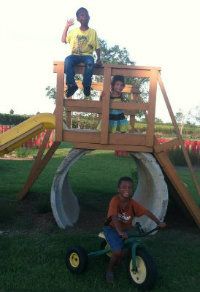














November is National Adoption Awareness Month, and Adoption is something very near and dear to my heart. You see, all three of my children joined me through the gift of adoption. J’Shawn, William, and Taleesa were placed with my as my foster children first before being settled into our forever home. There are many different types of adoption. From healthy new born infant through a private adoption, to caring for a family member’s child as your own, to opening your home a special needs sibling group from half away around the world. Regardless of how adoption was a choice for your family, we all share the same calling – that knowing your child is out there waiting for you, and doing the hard work of bringing them home, wherever they may be.
As you can Imagine, I am a HUGE advocate of adoption through foster care. I was a foster parent for 10 years and in that time had over 20 children placed in my home. Not being a parent before fostering, I can tell you that my life changed in ways I never would have imagined. Here are my thoughts on fostering/adoption through child protective services:
Lastly, the one thing I hold dear to my heart and I always tell myself is this – “In order for my family to be created, another was broken apart”- I don’t say this as though we are not deserving of having a family, rather this helps remind me that what we are given is truly a gift, and that even if I got placement of my child right out of the hospital, he’s lost something too. This is a grief that as parents we can’t take away for them, but be there for them as they work through it in their time and it their own way.
When deciding that adoption through foster care was the route for me, and that I was open to adoption of children of another race or ethnicity, I wanted to read all I could. All three of my children are African American, and I am Caucasian/Hispanic.
Black Baby, White Hands: A View From the Crib by Dr. Jaiya John
I read this book shortly after my oldest son, J’Shawn was placed with me at 19 months and learning that I would be able to adopt him. This book stayed with me long after I read it, and still touches me deeply.
Dr. John is obviously very well spoken and possesses a gift in the use of the English language – beautiful prose throughout the book. Initially, it was very hard for me to get through the book as Dr John kept pointing out all of the things he had wished his parents had done or not done or did differently, etc, etc. I kept identifying with the adoptive parent (s) and quite frankly vacillated between finding myself lacking as a parent or feeling that Dr. John was unappreciative and unsympathetic towards his parent’s journey into transracial parenting with absolutely no map. However, toward the end of the book, it was obvious that he greatly loved and respected his parents.
It was only after I had read the entire book and was able to reflect that I was able to take from the book that this was HIS story, not the story of his parent’s journey as transracial parents. This is story of a black boy raised in a white home, with white parents living in a (mostly) white community – his feelings of isolation, lack of identity and struggle to find himself. I guess what this book has helped me realize is – until the world is truly color blind, I won’t raise my son to be.
I’m not going to raise him wearing rose-colored glasses about the world and the people around him. I’d be doing him a disservice if I did. My son is black and I want him to know that and be proud of it. That’s part of who he is.
One of my biggest peeves, is when people tell me say to me” I bet you don’t even notice that he’s black, he’s just your son.” That is absolutely not true. Being black is part of who is he, I don’t love him regardless of whether or not he is black, one of the infinite reasons that I love him because he is.


For me, the scariest kind of book is one that has a subtle creepiness to it. You know something has happened, something is going on—you’re just not sure what, exactly. I love those kinds of books! And I recently found a great one by Jenni Mills, called Crow Stone.
Crow Stone is the story of Kit Parry, a young woman who is an engineer. She makes a living working on various freelance projects, quite often with archaeologists. Her fascination is with the underground world that few people see. Caves and mines scare her, but they pull her into their dark passages; she can’t stay away.
Kit has been asked to come to Bath, England to help on a project; the town sits atop old stone quarries which are becoming more and more unstable. There is a very real danger of collapse, with the threat of homes and shops sinking into the earth. It has been decided to fill in the quarries before that happens, and Kit would be the chief engineer on the project. It’s a big job, and would only add to her prestige in her field—but she hesitates.
Kit grew up in Bath. Her mother left when Kit was only two years old; the story Kit hears in bits and pieces from the townsfolk is that her mother ran off with a soldier, leaving Kit behind to be raised by her father. The summer Kit turned 14 was a hard summer; we know something terrible happened to her, and we know that she was taken away from her home and her father. But Kit has worked hard to bury those memories, and is not ready to share them with the reader. The more she thinks about this project, the more she decides that filling in the quarries will be the perfect way to bury her past—once and for all.
The author slowly reveals Kit’s past and present with alternating chapters; first in present day Bath, where she must work in a male-dominated field with superstitious stone miners, and a site foreman that she had a crush on as a teenager; and then we get a glimpse into that fateful summer when Kit (then known as Katie) was 14. We meet her (questionable) friends, and her father who is by turns loving and violent. As the story builds, the tension grows and the mystery of exactly what is going on grows too.
This is the type of book you should sink into. There are lots of details about mine engineering and urban archaeology, two topics I knew little about. The author describes being lost in an underground cave, and does a wonderful job of creating tension and anxiety. It’s not a fast-paced book, but I had a very hard time putting it down. The possibility of Kit and her friend Martin (a professor of archaeology) finding an old site once used by Roman soldiers to worship Mithras and trying to save the site before the quarries are filled in gave the chapters set in the present day an exciting urgency, while the chapters set in Kit’s past were ominous and filled with a creepy tension. There is no supernatural or paranormal element here; all the ugliness revealed is very human and very tragic because it is so real. This was a first novel, and I’m looking forward to reading more from Ms. Mills.

This impossible crime mystery is set in snowy Sparta, New York, which classics-minded readers will immediately identify as Syracuse, which is notorious for its two seasons of winter and July. A vicious creature calling himself Hog claims the credit for a series of deaths among victims who have no relationship with each other. The local police are so flummoxed that the city decides to call in a world-famous criminologist, Dr. Niccolo Benedetti .
Benedetti enlists the services of his former student, Ron Gentry, a local private detective, and the police inspector Fleisher. In the true tradition of the impossible crime mystery there are red herrings and clues to mystery spread generously about. The reveal genuinely surprised me. The relationship between Benedetti and Ron will call to mind Nero Wolfe and Archie Goodwin.
This novel won an Edgar award for Best Paperback Original Mystery in 1980. DeAndrea had won a Best First Novel Edgar previously for Killed in the Ratings. And he won one after for a reference book called Encyclopedia Mysteriosa. DeAndrea was only 44 when he passed away in 1996. His wife was mystery writer Jane Haddam.